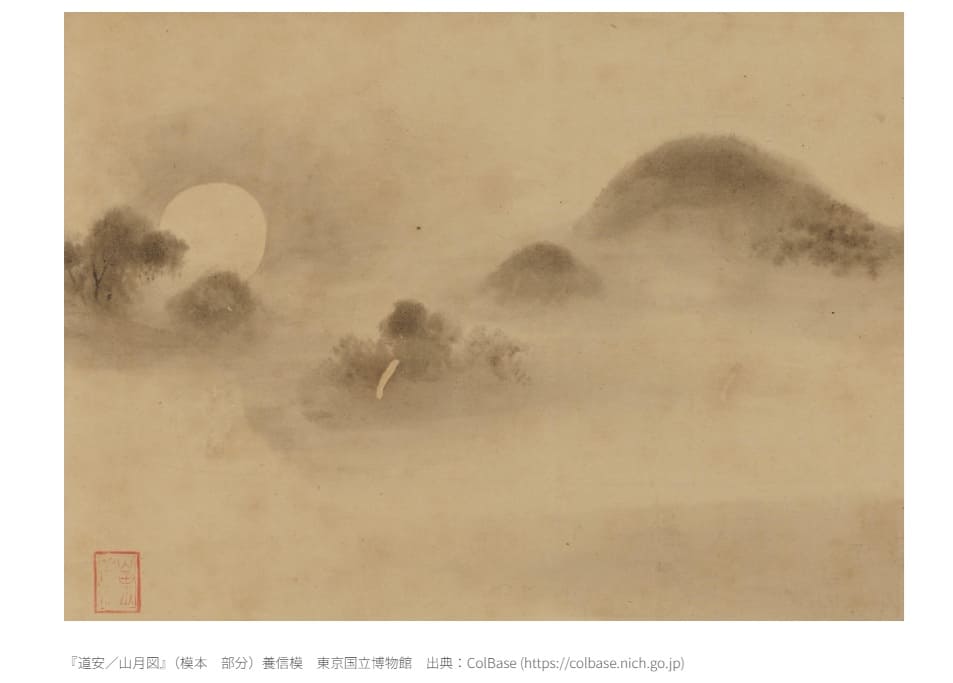



The charm of the “full moon” illuminating autumn nights. Akiko Baba [Understanding the Japanese Spirit through Waka Poetry]
1)
The serialised column ‘Understanding the Japanese Spirit Through Waka’ by poet Akiko Baba.
The twenty-sixth instalment focuses on the ‘Full Moon’. Appearing in the clear night sky, the full moon brightly illuminated gardens and hillsides, stirring people's hearts.
From the Mid-Autumn Moon to November, she explains two poems celebrating the full moon, which heighten the beautiful autumn atmosphere.
2)
The Hearts of Those Who Admired the Full Moon
Counting the moon's ripples on the water's surface,
Tonight truly feels like autumn has arrived.
— Minamoto no Shun
Water or sky, sky or water—
Indistinguishable, flowing together,
The clear autumn night moon.
— Anonymous
There is the phrase “snow, moon, and flowers”.
Representing the sentiments of Japan's four seasons, it possessed a great power to stir poetic hearts at each season's turn.
Admiring the moon in autumn—this custom persisted until barely half a century ago as the “moon-viewing” festival within the lives of ordinary folk.
The Japanese, fond of celebrating nature, cherished not only moon-viewing but also flower-viewing and snow-viewing as refined pastimes. How splendid that poems remain to record these moments.
3)
"Counting the moon's reflections upon the water's surface,
This very night is surely autumn's true essence."
This is a poem composed for the fifteenth night by Minamoto no Shōtoku, one of the leading poets of the mid-Heian period.
According to the preface in the Shūshū anthology, that day Shōtafu visited the home of an acquaintance with a lotus pond. Several men and women were already there, strolling around the pond in high spirits.
The moon, rising at that very moment, cast its reflection upon the pond water, creating a truly splendid scene.
4)
The poem deliberately captures that moment's ‘Oh!’ of wonder with a leisurely cadence, expressing the feeling of ‘counting the days and nights’ towards the mid-autumn full moon.
One notices how this somewhat childishly charming phrasing serves to heighten the impact of the second line: ‘Tonight, indeed, is the very heart of autumn.’
Moreover, had the opening line been ‘Upon the pond's surface,’ the scene would have felt far smaller, even diminishing the poem's quality. The power of poetic language is genuinely remarkable.
This poem later entered the imperial anthologies and came to be quoted in various contexts each time the fifteenth night arrived.
5)
Next, I wish to introduce a single moon poem by an anonymous amateur, along with its associated anecdote.
The scene is a poetry gathering at the residence of Tachibana no Toshitsuna. Toshitsuna's father was the Regent and Chief Minister, Yorimichi.
Though he inherited the Tachibana household, he was also immensely wealthy due to his father's prestige.
As a patron of the poetry world, he frequently hosted poetry gatherings at his residence in Fushimi, counted among the three most lavish mansions in the realm at that time.
6)
The theme for this day's gathering was “Moon over Water”.
Though first-rate poets were assembled, for some reason, no outstanding verse emerged that day, and a period of agonising over verses continued.
At that moment, a man who had been summoned from the provinces for menial duties and was guarding the residence, declared to the attendant samurai that he too had composed a poem.
7)
The assembled poets, intrigued, had the attendant recite his verse:
"Water or sky, sky or water—
Neither can be told apart,
Flowing clear through autumn night's moon."
Those who had been struggling must have felt as though their inner eyes had suddenly opened upon hearing this verse.
No poem surpassing it emerged at that gathering, and the assembly praised it, acknowledging their own shortcomings with the phrase ‘we were put to shame’ (Jikkinshō). This humility, too, is admirable.
8)
Incidentally, this anonymous poem, whose author's name remains unknown, was later included in the imperial anthology Shin Goshuishū, under the section ‘Autumn Ascending,’ three hundred years after its creation.
This means that throughout those three centuries, people never forgot this song composed by an anonymous amateur; they cherished it, recited it, and passed it down. Is this not also deeply moving?
Amidst the vast expanse of water and sky, traversing both, the moon remains as pure and clear as ever.
The charm of the “full moon” illuminating autumn nights. Akiko Baba [Understanding the Japanese Spirit through Waka Poetry]
https://intojapanwaraku.com/culture/286900/